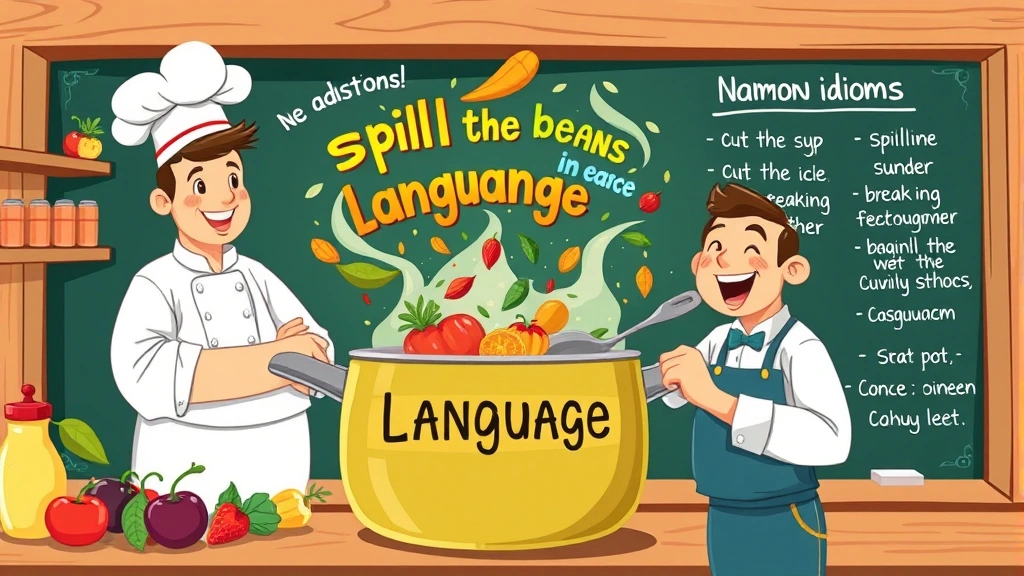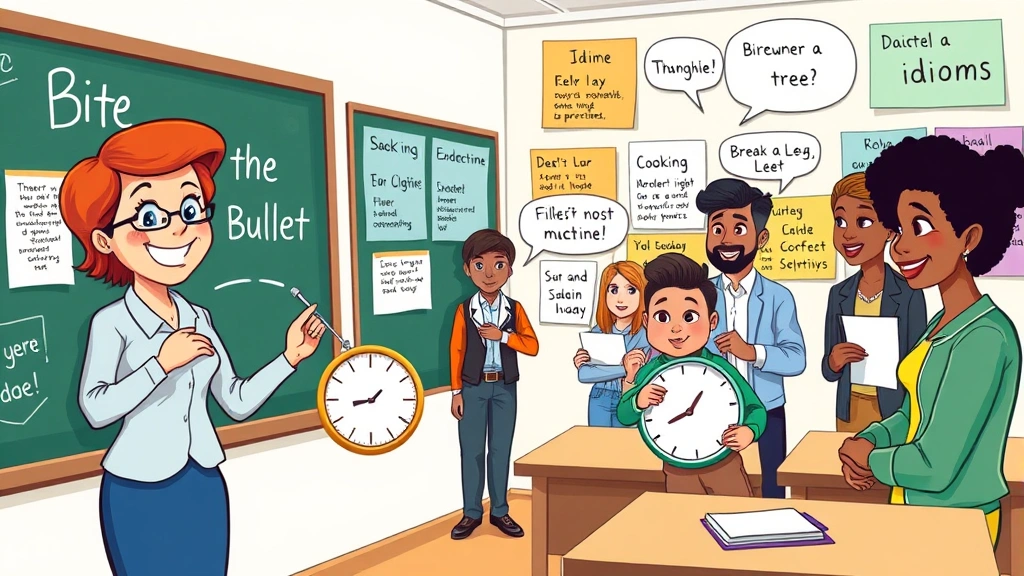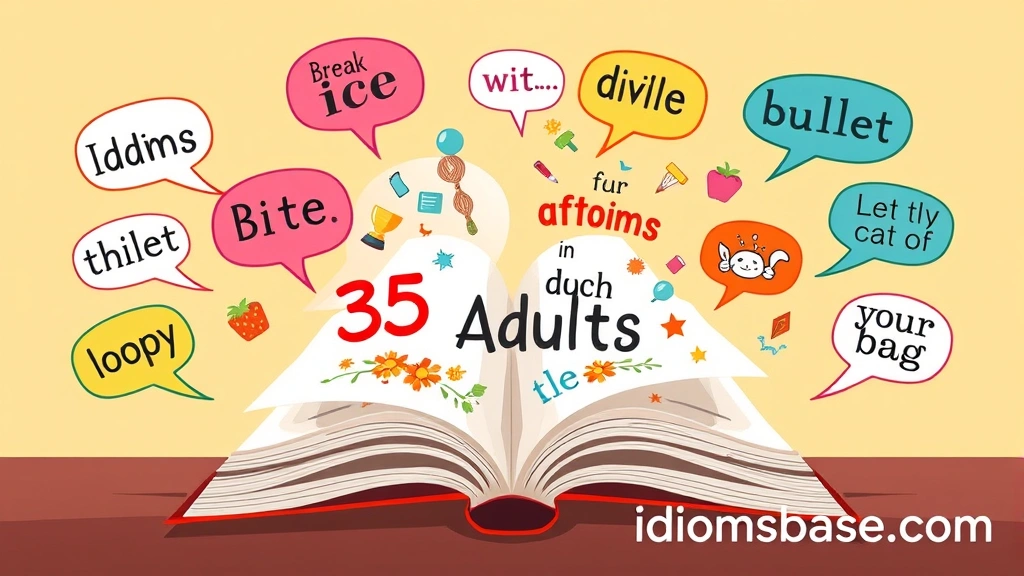Do you ever find yourself scratching your head when someone uses a phrase that just doesn't quite make sense literally? You're not alone! The English language is wonderfully rich with idioms – those colorful expressions where the meaning isn't obvious from the individual words. They're like secret codes that native speakers effortlessly understand, and once you get the hang of them, they'll seriously level up your communication game.
Think of idioms as the spices in the grand dish of language. They add flavor, nuance, and a touch of wit that can make your conversations and writing much more engaging. Whether you're aiming to sound more like a native speaker, understand movies and TV shows better, or simply appreciate the quirks of English, mastering these common idioms for adults is a fantastic step. Ready to dive in and unleash your inner wordsmith? Let's get started!
Why Idioms Matter in Adult Communication
Idioms aren't just for fun; they're essential for effective communication in many adult settings. They allow for more concise expression, add humor, and can convey complex emotions or situations in a relatable way. Understanding them is key to truly grasping context in business, social, and even family interactions.
35 Idioms to Elevate Your English
Here’s a fantastic list of 35 idioms frequently used by adults, complete with their meanings and examples to help you grasp them quickly.
-
Bite the Bullet: To endure a difficult or unpleasant situation.
- Example: "I had to bite the bullet and work extra hours to finish the project on time."
-
Break a Leg: Good luck! (Often said to performers).
- Example: "You've got your big presentation today – break a leg!"
-
Call It a Day: To stop working on something.
- Example: "It's getting late; let's call it a day and pick this up tomorrow."
-
Cut Corners: To do something poorly or cheaply to save time or money.
- Example: "We can't afford to cut corners on safety, even if it saves a few bucks."
-
Get Out of Hand: To become difficult to control.
- Example: "The party started to get out of hand when too many people showed up."
-
Hit the Road: To leave.
- Example: "It's getting late, so we should probably hit the road."
-
Jump on the Bandwagon: To join a popular activity or trend.
- Example: "Everyone's buying those new phones; I guess I'll jump on the bandwagon too."

-
Keep Your Chin Up: To stay positive in a difficult situation.
- Example: "I know things are tough, but keep your chin up – it'll get better."
-
Let the Cat Out of the Bag: To reveal a secret.
- Example: "I accidentally let the cat out of the bag about their surprise party."
-
Miss the Boat: To miss an opportunity.
- Example: "I really wanted to invest, but I think I missed the boat on that stock."
-
On the Same Page: To be in agreement or understanding.
- Example: "Before we proceed, let's make sure we're all on the same page."
-
Pull Someone's Leg: To playfully tease someone.
- Example: "Don't worry, I'm just pulling your leg; I didn't really spill coffee on your laptop."
-
See Eye to Eye: To agree with someone.
- Example: "My boss and I don't always see eye to eye, but we respect each other."
-
Spill the Beans: To reveal a secret.
- Example: "Come on, spill the beans! What did you get for your birthday?"
-
The Ball is in Your Court: It's your turn to make a decision or take action.
- Example: "I've done my part; now the ball is in your court to decide."
-
Under the Weather: Feeling unwell.
- Example: "I'm feeling a bit under the weather today, so I'll work from home."
-
When Pigs Fly: Something that will never happen.
- Example: "He'll clean his room when pigs fly!"

-
A Dime a Dozen: Very common and therefore not valuable.
- Example: "Ideas like that are a dime a dozen; we need something truly innovative."
-
Barking Up the Wrong Tree: To be pursuing a mistaken course of action or making a wrong assumption.
- Example: "If you think I took your pen, you're barking up the wrong tree; I haven't seen it."
-
Beat Around the Bush: To avoid coming to the point.
- Example: "Stop beating around the bush and just tell me what you want."
-
Cost an Arm and a Leg: Very expensive.
- Example: "That new car must have cost him an arm and a leg."
-
Every Cloud Has a Silver Lining: Every difficult or unpleasant situation has some positive aspect.
- Example: "Losing that job was tough, but every cloud has a silver lining – I found a better one!"
-
Get Your Ducks in a Row: To get everything organized.
- Example: "Before we launch the new product, we need to get our ducks in a row."
-
Go the Extra Mile: To make a special effort.
- Example: "Our team always goes the extra mile for our clients."
-
Have Your Head in the Clouds: To be unrealistic or daydreaming.
- Example: "He always has his head in the clouds, dreaming of winning the lottery."
-
In a Nutshell: Briefly; in summary.
- Example: "In a nutshell, the project was a huge success."
-
Keep an Eye On: To watch carefully.
- Example: "Could you keep an eye on my bag while I grab a coffee?"

-
Let Someone Off the Hook: To allow someone to avoid punishment or a difficult situation.
- Example: "The teacher let him off the hook for being late since it was his first time."
-
No Pain, No Gain: You have to work hard for what you want.
- Example: "The gym trainer kept saying, 'No pain, no gain!' during our tough workout."
-
Once in a Blue Moon: Very rarely.
- Example: "We only go out for dinner once in a blue moon."
-
Out of the Blue: Unexpectedly.
- Example: "She called me out of the blue after years of no contact."
-
Piece of Cake: Very easy.
- Example: "The exam was a piece of cake; I finished it in no time."
-
The Last Straw: The final problem in a series of problems that makes you lose patience.
- Example: "When he insulted my family, that was the last straw; I walked out."
-
Through Thick and Thin: Through good times and bad times.
- Example: "True friends stick together through thick and thin."
-
Your Guess Is As Good As Mine: I don't know the answer.
- Example: "Why the train is delayed? Your guess is as good as mine."
Key Takeaways
- Idioms Add Flavor: They make English more colorful and expressive.
- Context is King: The meaning of an idiom is rarely literal; it depends on the situation.
- Practice Makes Perfect: The more you hear and use idioms, the more natural they'll become.
- Boost Your Fluency: Understanding idioms helps you sound more like a native speaker.
Frequently Asked Questions (FAQs)
What is an idiom?
An idiom is a phrase or expression whose meaning cannot be understood from the ordinary meaning of its words. It's a figurative saying that has a commonly understood meaning among native speakers.
Why are idioms important to learn?
Learning idioms is crucial because they are widely used in everyday conversation, literature, movies, and media. Understanding them helps you grasp the full meaning of what's being communicated, improve your listening comprehension, and speak more naturally and fluently. They add nuance and depth to your language.
How can I learn idioms effectively?
The best way to learn idioms is by encountering them in context. Read English books, watch movies and TV shows, listen to podcasts, and pay attention to how native speakers use them. Try to incorporate new idioms into your own conversations and writing. Flashcards and idiom dictionaries can also be helpful tools for memorization.
Are idioms the same as proverbs or slang?
Not exactly. While all three are common expressions, there are differences:
- Idioms: Figurative phrases whose meaning isn't literal (e.g., "kick the bucket").
- Proverbs: Short, well-known sayings that express a general truth or piece of advice (e.g., "Actions speak louder than words").
- Slang: Informal words or phrases often specific to a particular group or time period, and their usage can be fleeting (e.g., "lit," "FOMO").
Can I use idioms in formal writing?
It depends on the context. While some idioms are widely accepted and can add a touch of personality to semi-formal writing, many are best reserved for informal conversations. In very formal or academic writing, it's generally safer to use more direct and literal language to avoid ambiguity. Always consider your audience and the purpose of your writing.
What if I use an idiom incorrectly?
Don't worry too much! Everyone makes mistakes, especially when learning a new language. If you use an idiom incorrectly, a native speaker will likely understand what you meant or gently correct you. It's part of the learning process. The effort to use them shows your dedication to mastering the language.
Are there regional differences in idioms?
Yes, absolutely! While many idioms are universally understood across English-speaking countries, some are more common in certain regions (e.g., British English vs. American English). For instance, "take a punt" (take a chance) is more common in British English, while "take a rain check" (postpone) is more common in American English. Being aware of these regional variations can be helpful.
By embracing these 35 common idioms, you're not just memorizing phrases; you're unlocking a deeper understanding of English culture and communication. So go ahead, give them a try! You'll be speaking like a seasoned pro in no time, and trust me, that's no piece of cake – it's a journey worth taking. Which idiom will you use first? Let us know in the comments below!






